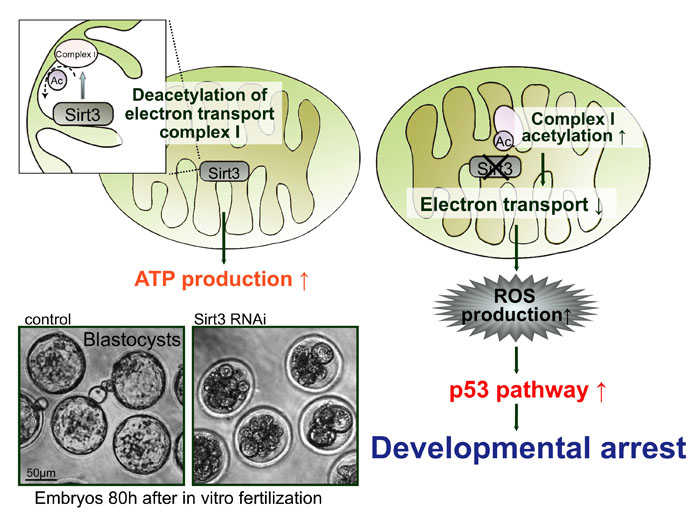Protecting preimplantation embryos: a dead Sirt(3)
Infertility affects approximately 10% of couples worldwide. Although assisted reproductive technologies such as in vitro fertilization are commonly used in developed countries to treat infertile couples, the processes remain relatively inefficient. Moreover, 60% of naturally fertilized embryos do to survive to delivery, mainly because of early developmental failure before and during implantation. Better understanding of events such as preimplantation embryo development could help improve the efficiency of assisted reproductive technologies. In this context, Kawamura and colleagues have now determined that Sirt3, a member of the sirtuin family of NAD+-dependent protein deacetylase/ADP-ribosyltransferases, helps protect preimplantation mouse embryos against stress conditions during in vitro fertilization and culture. Mouse embryos in which Sirt3 was inactivated showed increased generation of mitochondrial ROS and a decreased ability to form blastocysts in vitro. Furthermore, they showed decreased implantation and fetal growth rates upon transfer into pseudopregnant mice. Mechanistic analysis indicated that p53 expression was upregulated by the increased levels of ROS induced upon Sirt3 inactivation, and that this was key to the negative effects of Sirt3 inactivation. Of potential clinical significance, the in vitro negative effects of Sirt3 inactivation on mouse embryos were overcome by culture in the presence of either an antioxidant (N-acetyl-L-cysteine) or low oxygen conditions. (Cited from “In This Issue” by Karen Honey in JCI Volume 120, Issue 8, 2010 with permission)
Program member
Hiroki Kurihara (Department of Molecular and Cellular Biology, Graduate School of Medicine)

Sirt3 induces developmental arrest in preimplantation embryos through a ROS-p53 pathway.
